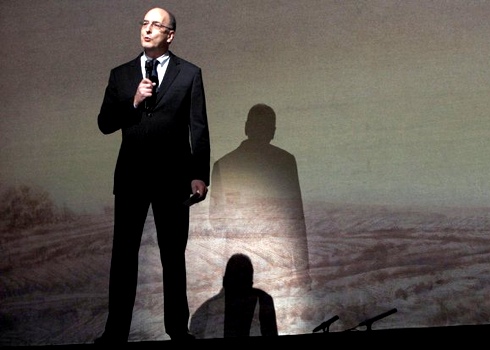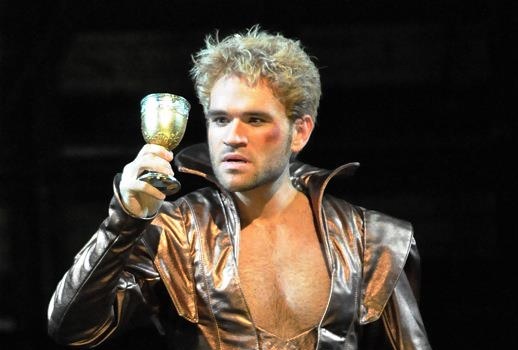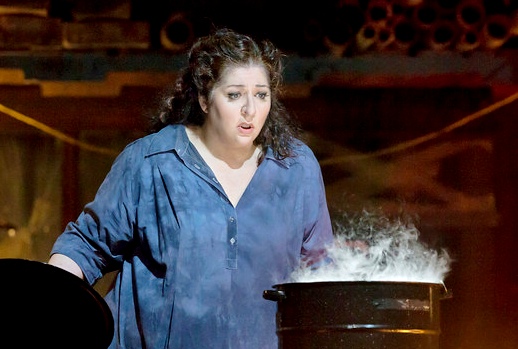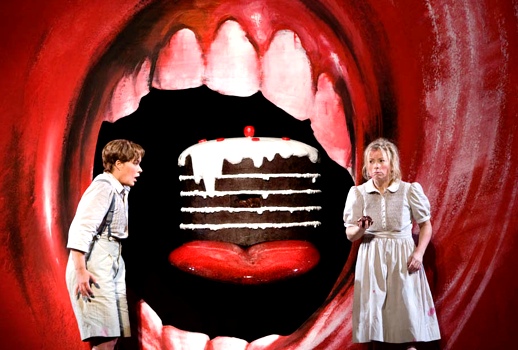
In addition, Gelb’s reputation for being able to work with even the most prickly artists gave hope that the house would take on a less cockily antagonistic attitude to performers than it had during the Volpe years. In fact, singers, such as Diana Damrau have spoken publicly about how under Peter Gelb, they feel that they have a permanent home at the Met and that they appreciate the ability to sing a great variety of roles at the house and be offered new production and Live in HD engagements.
Still, that list of major singers who enjoy productive ongoing relationship with the house has some pretty significant gaps. Now, before I start venting, I recognize that it’s an opera queen badge of honor to carry a torch for one’s personal Mawrdew Czgowchwz who has been maliciously neglected by the Spider of the Escorial ruining running your local opera company. However, one doesn’t have to look far to find singers who perform regularly in the US, but have still been mystifyingly neglected by the Met under Gelb.
Anna Caterina Antonacci has still never appeared despite being the embodiment of the kind of performer that Gelb claims to want for his opera company. Nina Stemme, who is arguably the greatest Wagner soprano at the moment, has sung only one measly run of Ariadne auf Naxos since Gelb took over. One can also point to the scanty Met resumes of Günther Groissböck, Alexander Tsymbalyuk, or Anne Schwanewilms—all singers who have sung impressively in the house, have high-profile engagements around the operatic world, and show no sign of coming back to the Met. I will leave it to my fellow parterrians to name other singers who should be appearing regularly at the Met yet still haven’t even had their debut (Maria Agresta, anyone?)

The era of the superstar singer appears to be over at the Met. I can’t name a single artist who will guarantee a sold-out run at the Met. Similarly I can’t name a singer for whom the act of cancelling is considered major news. Remember when the Wall Street Journal ran an editorial excoriating Cecilia Bartoli for cancelling the Così fan tutte broadcast (editorial is not online but is referenced here) or when the suspense over whether Pavarotti would actually perform his final scheduled performances of Cavaradossi generated breathless news coverage? For better or worse, those times are past. Neither the Met’s casting nor marketing have adjusted to this new reality. Opera lovers will still show up at the Met for great singers, but they need help finding and following those singers over the course of their Met careers.
New singers show up at the Met unheralded, with little fanfare or publicity by the company. They debut in a revival that seasoned operagoers didn’t realize they needed to make an effort to see. By the time word of mouth gets around that someone special has appeared, their run is done. All too frequently, those singers disappear for a season or two and by the time they return, it’s like they’re starting their New York career from scratch again. And if they’re relegated to the salt mines of La Bohème revivals, they don’t have a chance to connect with frequent opera-goers at all. It might be seasons before a singer gets the plum engagement that could earn them a loyal New York following. Both the singer and the Met audience have lost out. And the Met has undermined its relationship with a promising young singer whom it needs.

On Thursday we learned that Fabiano has won as well the 2014 Richard Tucker award, which means that he will get lots of publicity and will be the focus of a gala broadcast nationwide on PBS. All this will come in very handy to San Francisco Opera’s efforts to sell tickets for its 2014/15 season. This is incompetence of the highest order on the part of the Met. Why give Fabiano the exposure of 14 performances of Die Fledermaus only to have him disappear from view? Surely, there was someone at the Met who felt he deserved a steady slate of Met appearances.
Jamie Barton first debuted in 2011, recently won the Cardiff Singer of the World contest, and made an enormously impressive role debut as Adalgisa (and inspired a remarkably fiery performance from Angela Meade, to boot). She’s not back next season either, which probably means that she will be this year’s recipient of the Sills Award.
While Kristine Opolais has certainly gotten lots of press for her back-to-back appearances at the Met two weekends ago, let’s remember that her actual engagement for this season was for the second cast of Madama Butterfly, meaning that she got limited rehearsals, no radio broadcast and no guarantee of much in the way of reviews—hardly the way to showcase a singer whom the Met’s website hails as a “rising soprano.” Had the HD gone according to plan with Anita Hartig as Mimi, few opera lovers would have taken note of Opolais at all. Next season, she returns as Mimi, in the second cast again, but at least she gets the broadcast. If the rumor mill is to believed, she gets a new production of Manon Lescaut in two seasons. Wouldn’t it be nice if more New York opera lovers were aware of her so that the they might eagerly scoop up tickets?

Perhaps Gelb’s intention was to convey that after seven years of blindly swinging at the singer piñata, something special had finally tumbled out. But this comes across as a horrible, cavalier way for the Met to manage a singer’s career at the house. The Met isn’t America’s Got Talent, for fuck’s sake. Christine Goerke had at least three weeks of rehearsal in the house before opening night. Was no one from the Met’s artistic staff available to hear her singing? Was no one from the Met willing to declare that this was a Brünnhilde voice? Even before she sang in Die Frau couldn’t someone from the Met’s overachieving artistic staff have schlepped their Applause-O-Meter all the way to Chicago to hear her Elektra and the reaction it got? Does Gelb not trust his musical staff? Does he feel he’s not personally qualified to judge singers based on rehearsal? Or, worst of all does he feel the best measure of a singer is the ability to rouse the Met’s audience from its Fafnerian slumbers in some sort of Trial by Torpor?
It goes without saying that Goerke is not back in 2014-5, even though there’s room on her schedule and she lives in New Jersey—no visa, airfare, or housing arrangements needed. And even though, of next year’s repertory, she already sings Santuzza and Eboli, and she would be an exceptional choice for Judith in Bluebeard’s Castle or Amneris if she were interested in either role. But, so far as we know, the next time Goerke will appear at the Met is not until 2018-2019, five seasons from now. The result of this gap in her Met appearances will be that her journey to singing Brünnhilde at the Met will be a rocky climb rather than a carefully planned ascent. With better planning by the Met, the audience could be clamoring to hear her Brünnhilde in 2018-19, even if means subjecting themselves to another 18 hours of the clunking Machine.
Of course, it’s not the Met’s responsibility to manage singers’ careers for them or to serve as their publicist. But the Met does have to sell tickets—and that means doing a better job of showcasing new singers. Why can’t the Met website provide better bios and links to singer-chosen youtube clips for each singer on its roster? Why not have excerpts from the singer intermission interviews on SiriusXM? Why can’t the Met have a weekly podcast featuring audio clips and interviews for everyone who’s scheduled to debut in the coming week or send this out in a link-filled email to subscribers?
Without more planning and effort, casting at the Met will remain a self-fulfilling prophecy. Plum assignments will be granted to the singers whom Gelb feels are exciting, true, but so many great singers aren’t given opportunities to showcase their talents. It would be nice to see the Met make more high profile bets, as they evidently did with Hartig, by giving her a HD broadcast and a prominent feature on the home page. Of course, it would have been great if she had actually sung the HD, but the upshot should not be for the Met to balk at giving new singers at the house prominent assignments.

Few opera companies would be willing to assemble an expensive Forza production if the project could fall apart. If right now, Jonas Kaufmann and the Met were thinking about the 2016 schedule rather than the 2021 schedule, all parties could plan with more confidence. Singers could be performing the roles that they feel in their voices right now and could be eagerly experimenting. If, say, Anna Netrebko works through Salome with a coach and decides that she’s ready to try it on stage, wouldn’t it be great if she could get it onto her schedule in the next couple of years without throwing some opera company’s and other singers’ plans into disarray? And why shouldn’t the company where she sings her first Salome be the Met?
Since the Met launched this operatic arms race back in the Bing era, the Met is the logical candidate to open mutual disarmament talks with other opera companies and figure out how to unwind this practice. At a minimum, the Met could leave more of each season unplanned until one or two years out to allow for more opportunistic and flexible artistic planning.
Just think, next season could build on the breakout performances of this one. We could have some performances of La Favorite with Barton and Bryan Hymel (there must be production to borrow from somewhere) or Schwanewilms could return for the Contessa in Nozze di Figaro. This season, Dmitri Tcherniakov had a great success with his Prince Igor production and one has high hopes for Olga Peretyatko‘s debut in I puritani. Neither returns next season, alas, but with greater scheduling flexibility, the Met could present Tcherniakov’s smashing new production of The Tsar’s Bride in 2015-2016, complete with Peretyatko’s riveting Marfa.

What I hoped would mark the beginning of a concerted effort by the Met to re-engage with the broader New York community and to reassert the importance of opera in the cultural life of the country has sadly fizzled out. Does Gelb have no other favors he can call in to get opera back into the cultural conversation? Otherwise, opera remains that musical genre beloved by rich people and psychopaths or that art form that is only interesting when performed by expressionless moppets singing age-inappropriate material or technique-deficient carphone salesmen.
It’s not the Met’s fault that the general public has such a distorted idea of opera, but the Met has a vital stake in challenging this misinformation. How else is it going to rebuild its audience? While the Met has to get opera lovers back in the habit of attending the Met again, it has also the more difficult job of getting people who’ve never been to an opera to attend once and ideally to become regular operagoers.
In a culture with an itchy Twitter finger, how do you sell an art form that takes its time to unfold? Do you position it as the cultural equivalent of the slow-food movement? It’s got to be more effective than selling opera to newbies with bus shelter ads featuring photogenic faces without any context. Are people supposed to go to the opera to gawk at pretty people on stage? It’s New York City—you can go to the the Standard Hotel and stare at pretty people up close in the bar for the cost of an overpriced cocktail, no tickets or advance planning required.

- Shouldn’t the Met have a presence in the Macy’s Thanksgiving Day parade featuring the show premiering on New Year’s or the holiday presentation for children?
- Couldn’t the Met make a large number of seats at the HD Live weekday retransmissions free at selected theaters in the NYC area for students or for people who enter a ticket raffle?
- Couldn’t the Met have one performance a season where all tickets, even in the parterre boxes, are $25 or less?
- Couldn’t there be Sunday matinees at friendly prices in the final weeks of the season when the orchestra and chorus no longer have rehearsals on weekdays?
- Why not institute an evening geared to first-time opera goers? Call it “First-Time Fridays.” (The ad campaign practically writes itself: “You’ll never forget the first time you met Carmen/visited ancient Egypt/fell in love in Paris/etc.”) Participants in First-Time Fridays who tweeted about their first time could get a voucher for a discount on a future ticket
Dozens of television shows film in NYC. Is there no opportunity for creative product placement? The Met would make an atmospheric location for a drama or mystery show. Why can’t the Met stars get more slots on talk or late night TV shows? Jimmy Fallon does novelty music numbers all the time; he even had the chutzpah to sing a duet with Billy Joel. Surely, he could be convinced to have a go at a duet with some divo or diva. Couldn’t Ambrogio Maestri have shared one of his recipes on The Chew? They could have also interviewed the chef of the Grand Tier restaurant who has the nightmare cooking challenge of having a 100+ people sit down to dinner at the exact same time with only 25 minutes to dine. I can think of any number of opera singers who would have a field day with the hostesses of The View. It might seem like pandering, but it’s good outreach.
Why can’t the Met do a free concert or two in Central Park in September before the season starts when there are lots of big names in town for rehearsals and the weather is lovely? As a supplement to the annual Open House, why not provide a free live streaming video feed of a dress rehearsal? This way anyone interested in the open house can attend, at least virtually.
Why not make some of the Met’s HD telecasts available through Netflix streaming service for brief time period? Offering a free trial of the Met Player is nice, but making people go through a complicated sign up procedure for a free trial of Met player when millions of people have Netflix already just needlessly limits the Met’s promotional reach. Netflix has an incredibly sophisticated recommendation engine, couldn’t it be used to target subscribers who are likely to appreciate a scientifically chosen streaming opera?
Again, the Met needs to go where its potential audience is and not wait for its audience to find the Met. If some of these ideas are unrealistically expensive because of features of the union contracts, isn’t now the perfect time to revise those contracts?

When they arrive at the house, they must step in from the spacious plaza into the teeming lobby, that is if they can ever get past the patrons having unsuccessful first encounters with revolving doors. Security people bark unhelpful instructions rather than actually do something about the people loitering at the most congested places to stand in the Met lobby. Once past the ticket scanners, their bags will be pointlessly searched, further impeding traffic flow. Bag-checking is an unfortunate hangover from over a decade ago when that drama queen Rudy Giuliani insisted on it for when he went to the opera. No other performing facility in NYC routinely searches bags.
There is no helpful signage to help operagoers find their way to their their seats or to the inadequate restroom facilities. Only the elevators have signs to tell you which level you are on in the opera house, but there are no signs to direct patrons to the elevators. If the operagoers have splurged on orchestra seats, they first must contend with the traffic jams at the poorly thought out entrances at orchestra level. Ushers are not positioned along the main aisle to help people find their seats or deal with the surprising numbers of confrontations caused by people sitting in the wrong seats. It is only when the lights are about to go down that the ushers spring into action to help the dazed and confused. On a good night, all the ticket holders in the orchestra are seated by the time the performance starts, but usually there is still noisy reshuffling going on well after the downbeat.
If they made the mistake of arriving hungry, they have the option of having an extremely expensive, rushed dinner or waiting 15 minutes in a line at intermission to choose from a food menu seemingly cribbed from a Good Housekeeping magazine circa 1972 (“Surprise your family with a sandwich served on an exotic croissant.” ) There is nothing at the Met that a vegan can eat—one of the many signals to a young person attending the opera for the first time that the opera may not really be for them.
Signor Fatale has requested that I point out that he believes that I have made attending a performance at the Met sound more appealing than it is in reality. Nonetheless, no one goes or doesn’t go to the Metropolitan Opera based solely on its user-friendliness. But they may not come back as frequently or as readily, particularly when the Live in HD performance is cheaper, more user friendly and has a half-time show. The Met should at least be able to compete with the Metroplex on food.

The Met could even set up its own opera-themed food truck. Anyone for Pasta alla Norma before Norma? Fish and chips before Die Frau Ohne Schatten? Better still, the Met could sponsor a contest to create an opera-themed food truck and I bet you could get a six episode reality show on The Food Network out of that. I know the Met doesn’t own Damrosch Park, but Lincoln Center has just neglected it for the past 40 years.
While the necessary full-scale renovation to expand and reconfigure the house’s public space is unlikely, the Met could extend the lobby level further into the plaza (as originally planned) and reconfigure the rear rows of the orchestra to widen the aisle at the back of the house so that the traffic flow is not quite so horrible. While helpful signage would be a boon to the bewildered, the Met could deploy iBeacons and an iPhone app as baseball stadiums have done. Smartphones could help guide patrons to their seats, allow them to pre-order food for intermission, purchase merchandise or a download of the SiriusXM broadcast of the performance they just attended. Attendees could use that same app for an automatic download of program notes complete musical examples for review before the performance
Fixing the Met will take lots of little changes, some really big ones and a transformational leader who can bring about those changes soon. The Met needs a General Manager with a fierce commitment to opera as an art form and a vision for how an opera company can thrive in a culture that doesn’t think it needs opera at all. Is Peter Gelb the hero the company needs right now? If the Met emerges on more stable financial footing after the upcoming union negotiations, will he use that opportunity to implement a plan that guides the Met towards a future every bit as illustrious as the Met’s past. Nothing I’ve read gives me the confidence that he’s the guy who can get that done. I hope desperately to be proven wrong.
Photos: Mary Altaffer (Gelb), Cory Weaver (Fabiano), Wilfried Hösl (Kaufmann), Ken Howard (Goerke, Met lobby, Hansel and Gretel)





Comments